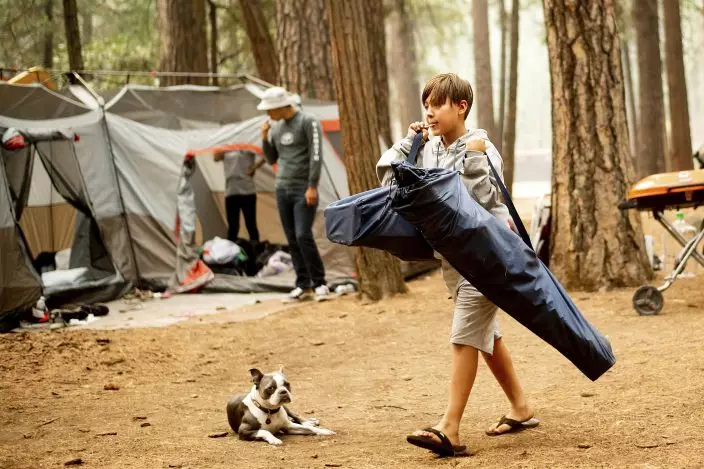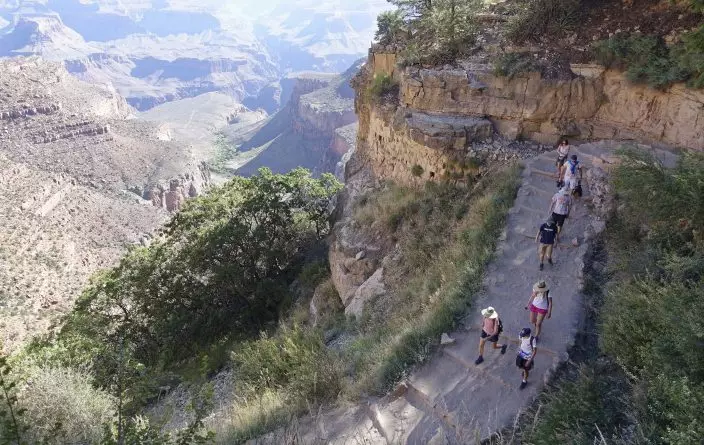Food trucks. Wi-Fi. Hot showers.
Those campground upgrades could be coming to a national park near you.
The Interior Department is reviewing recommendations to modernize campgrounds at national parks. The recommendations posted online this week come from an advisory committee created under former Interior Secretary Ryan Zinke that has been looking at ways for private businesses to operate on public lands.

FILE - In this July 25, 2018, file photo, River Martinez, 10, breaks camp at the Upper Pines Campground in Yosemite National Park, Calif. The Interior Department is considering recommendations to modernize campgrounds within the National Park Service. (AP PhotoNoah Berger, File)
The vice chairman of the Outdoor Recreation Advisory Committee, Derrick Crandall, said many campgrounds don't meet visitors' expectations. Allowing the private sector to run them would free up park staff for interpretation, safety needs or other visitor services, he said.
Redesigning some campgrounds, and adding running water, tent and cabin rentals, food trucks, extended family campgrounds and Wi-Fi to select sites also could boost revenue and encourage more people to camp in national parks, the committee said.
"We're basically suggesting that would be a way to improve overall camping experiences," Crandall said. "Are we talking about pricing people out of national parks through this? Not at all."

FILE - In this July 27, 2015, file photo, the busy Bright Angel Trail is crowded with hikers headed down into the Grand Canyon at Grand Canyon National Park, Ariz. The Interior Department is considering recommendations to modernize campgrounds within the National Park Service. (AP PhotoRoss D. Franklin, File)
The Interior Department isn't obligated to enact the recommendations but has said it doesn't have the money to modernize the more than 1,420 campgrounds in its system nor does every campground need upgrades.
"Once the report is reviewed, we'll respond accordingly," department spokesman Nicholas Goodwin said.
Environmentalists say the proposal would price out some visitors and benefit special interest groups. The committee is made up of representatives from the tourism, manufacturing, hospitality and recreation industries.
More than one-third of the country's 419 national park units have campgrounds that range from primitive, backcountry sites with no amenities to campgrounds that are easy to reach by road. About 6% are operated by concessionaires, according to the committee. Few campgrounds have amphitheaters, Wi-Fi, electricity or hot showers year-round.
Campgrounds at the Grand Canyon in Arizona, Yosemite in California, Zion in Utah, Rocky Mountain in Colorado, Acadia in Maine and Assateague Island National Seashore off the coast of Virginia and Maryland have the highest occupancy rates within the Park Service.
More than 9.2 million people stayed at campgrounds last year, led by tent campers, people traveling in RVs, backcountry campers and those staying at sites run by concessionaires, the Park Service said.
The committee suggested selecting five to 10 national park sites by December, including those with low visitation numbers, for a pilot project on upgrades.
Larger campgrounds that already are operated by concessionaires at places like Yellowstone and Grand Teton would be a good place to start, Crandall said. The committee also raised the possibility of expediting environmental reviews for projects and black-out dates during peak visitation times for senior citizens who get discounts of campground fees.
Clay Cutler, who lives in Colorado Springs, Colorado, said he doesn't need much when he goes camping, just a flat piece of ground to pitch a tent, a fire ring and good company.
"I'm not going and looking for Wi-Fi," said Cutler, 31. "That's 99 percent of the reason I go camping to get away from that and enjoy nature."
UNITED NATIONS (AP) — Russia on Wednesday vetoed a U.N. resolution sponsored by the United States and Japan calling on all nations to prevent a dangerous nuclear arms race in outer space, calling it “a dirty spectacle” that cherry picks weapons of mass destruction from all other weapons that should also be banned.
The vote in the 15-member Security Council was 13 in favor, Russia opposed and China abstaining.
The resolution would have called on all countries not to develop or deploy nuclear arms or other weapons of mass destruction in space, as banned under a 1967 international treaty that included the U.S. and Russia, and to agree to the need to verify compliance.
U.S. Ambassador Linda Thomas-Greenfield said after the vote that Russian President Vladimir Putin has said Moscow has no intention of deploying nuclear weapons in space.
“Today’s veto begs the question: Why? Why, if you are following the rules, would you not support a resolution that reaffirms them? What could you possibly be hiding,” she asked. “It’s baffling. And it’s a shame.”
Russia’s U.N. Ambassador Vassily Nebenzia dismissed the resolution as “absolutely absurd and politicized,” and said it didn’t go far enough in banning all types of weapons in space.
Russia and China proposed an amendment to the U.S.-Japan draft that would call on all countries, especially those with major space capabilities, “to prevent for all time the placement of weapons in outer space, and the threat of use of force in outer spaces.”
The vote was 7 countries in favor, 7 against, and one abstention and the amendment was defeated because it failed to get the minimum 9 “yes” votes required for adoption.
The U.S. opposed the amendment, and after the vote Nebenzia addressed the U.S. ambassador saying: “We want a ban on the placement of weapons of any kind in outer space, not just WMDs (weapons of mass destruction). But you don’t want that. And let me ask you that very same question. Why?”
He said much of the U.S. and Japan’s actions become clear “if we recall that the U.S. and their allies announced some time ago plans to place weapons … in outer space.”
Nebenzia accused the U.S. of blocking a Russian-Chinese proposal since 2008 for a treaty against putting weapons in outer space.
Thomas-Greenfield accused Russia of undermining global treaties to prevent the spread of nuclear weapons, irresponsibly invoking “dangerous nuclear rhetoric,” walking away from several of its arms control obligations, and refusing to engage “in substantive discussions around arms control or risk reduction.”
She called Wednesday’s vote “a real missed opportunity to rebuild much-needed trust in existing arms control obligations.”
Thomas-Greenfield’s announcement of the resolution on March 18 followed White House confirmation in February that Russia has obtained a “troubling” anti-satellite weapon capability, although such a weapon is not operational yet.
Putin declared later that Moscow has no intention of deploying nuclear weapons in space, claiming that the country has only developed space capabilities similar to those of the U.S.
Thomas-Greenfield said before the vote that the world is just beginning to understand “the catastrophic ramifications of a nuclear explosion in space.”
It could destroy “thousands of satellites operated by countries and companies around the world — and wipe out the vital communications, scientific, meteorological, agricultural, commercial, and national security services we all depend on,” she said.
The defeated draft resolution said “the prevention of an arms race in outer space would avert a grave danger for international peace and security.” It would have urged all countries carrying out activities in exploring and using outer space to comply with international law and the U.N. Charter.
The draft would have affirmed that countries that ratified the 1967 Outer Space Treaty must comply with their obligations not to put in orbit around the Earth “any objects” with weapons of mass destruction, or install them “on celestial bodies, or station such weapons in outer space.”
The treaty, ratified by some 114 countries, including the U.S. and Russia, prohibits the deployment of “nuclear weapons or any other kinds of weapons of mass destruction” in orbit or the stationing of “weapons in outer space in any other manner.”
The draft resolution emphasized “the necessity of further measures, including political commitments and legally binding instruments, with appropriate and effective provisions for verification, to prevent an arms race in outer space in all its aspects.”
It reiterated that the U.N. Conference on Disarmament, based in Geneva, has the primary responsibility to negotiate agreements on preventing an arms race in outer space.
The 65-nation body has achieved few results and has largely devolved into a venue for countries to voice criticism of others’ weapons programs or defend their own. The draft resolution would have urged the conference “to adopt and implement a balanced and comprehensive program of work.”
At the March council meeting where the U.S.-Japan initiative was launched, U.N. Secretary-General António Guterres warned that “geopolitical tensions and mistrust have escalated the risk of nuclear warfare to its highest point in decades.”
He said the movie “Oppenheimer” about Robert Oppenheimer, who directed the U.S. project during World War II that developed the atomic bomb, “brought the harsh reality of nuclear doomsday to vivid life for millions around the world.”
“Humanity cannot survive a sequel to Oppenheimer,” the U.N. chief said.

United States Ambassador and Representative to the United Nations Linda Thomas-Greenfield addresses members of the U.N. Security Council before voting during a meeting on Non-proliferation of nuclear weapons, Wednesday, April 24, 2024 at United Nations headquarters. (AP Photo/Eduardo Munoz Alvarez)

FILE - U.S. Ambassador to United Nations Linda Thomas-Greenfield speaks on Thursday, April 18, 2024, in Tokyo. The U.N. Security Council is set to vote Wednesday, April 24, 2024, on a resolution announced by Thomas-Greenfield, calling on all nations to prevent a dangerous nuclear arms race in outer space. It is likely to be vetoed by Russia. (AP Photo/Eugene Hoshiko, Pool, File)













